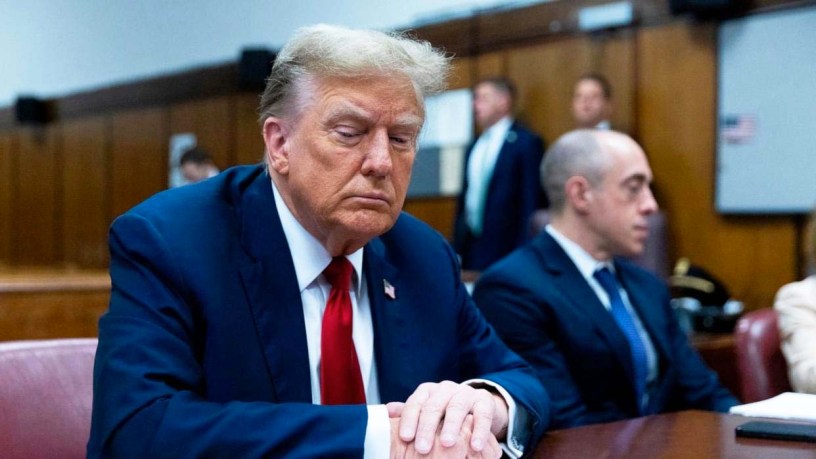Former President Donald Trump sits inside a Manhattan criminal court in New York, on April 15, 2024.
NEW YORK — Former President Donald Trump is on trial in New York City, where he is facing felony charges related to a 2016 hush money payment to adult film actress Stormy Daniels. It marks the first time in history that a former U.S. president has been tried on criminal charges.
Trump arrived at the courtroom at 9:32 a.m. flanked by members of his legal team. In brief remarks to reporters on the way in, he called his criminal trial an “assault on America.”
“Nothing like this has ever happened before,” Trump said, marking his first comments of the day. “There is no case,” he said. “This is political persecution.”
Trump also attacked President Joe Biden and said the case should not go forward.
Trump last April pleaded not guilty to a 34-count indictment charging him with falsifying business records in connection with a hush money payment his then-attorney Michael Cohen made to Daniels in order to boost his electoral prospects in the 2016 presidential election.
Jury selection could take up to two weeks, with the entire trial expected to last between six and eight weeks.
Following the arguments over alleged witness intimidation, prosecutors signaled they may seek to have Trump held in contempt.
A limited gag order Judge Merchan imposed in recent weeks prohibits Trump from attacking witnesses and others associated with the case.
“Shortly, we will be seeking order to show cause as to why defendant should not be held in contempt,” prosecutor Josh Steinglass said, suggesting Trump violated Merchan’s order.
Steinglass argued that several pieces of evidence related to Trump’s alleged “pressure campaign” meant to “keep witnesses off this stand, at this trial” should be introduced at trial.
Steinglass said Trump’s public commentary amounted to a “thinly veiled effort to intimidate” two of the government’s star witnesses, Michael Cohen and Stormy Daniels.
“The defendant himself has publicly embraced the public strategy of going after his perceived enemies,” Steinglass said.
“These tweets, phone calls and emails” should be permitted, Steinglass said. “It’s a clear effort to raise the cost of cooperation.”
Trump’s public postings, Steinglass argued, demonstrate Trump’s attempts to silence potential fact witnesses and “relate to his consciousness of guilt.”
Trump attorney Todd Blanche pushed back, saying that Trump has been “facing criticism from all sides … the media and others … and he’s defending himself” to his “millions and millions of followers.”
After the arguments, Judge Merchant ruled that prosecutors will not be allowed to play audio or video of the former president’s infamous “Access Hollywood” tape or his video deposition from the E. Jean Carroll defamation case for jurors.
Steinglass argued that the words used in the “Access Hollywood” tape was necessary for jurors to get a complete picture of their case. Blanche framed the video as “extremely salacious evidence that’s very, very, very prejudicial.”
On the matter of the “Access Hollywood” tape, Merchan reaffirmed his prior ruling that it should not be played for the jury — but said prosecutors can read Trump’s words aloud.
Merchan said that before jury selection can begin “there are a couple of loose ends we need to go over before we start.”
The first item, Merchan said, was a pair of motions filed by Trump’s legal team seeking his recusal from the case, citing his past comments in interviews and his daughter’s work with a Democrat-affiliated firm.
The motions, Merchan said, cite “pages and pages of screen grabs, articles, social media posts and the like” that amount only to “a series of inferences, innuendos, and unsupported speculation.”
To call them “attenuated is an understatement,” Merchan said. Merchan denied the motion and said the court would not address the matter further.

